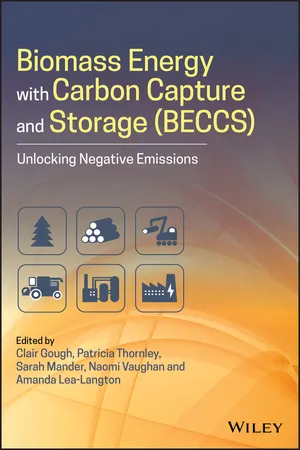
Biomass Energy with Carbon Capture and Storage (BECCS)
Unlocking Negative Emissions
- English
- ePUB (mobile friendly)
- Available on iOS & Android
Biomass Energy with Carbon Capture and Storage (BECCS)
Unlocking Negative Emissions
About this book
An essential resource for understanding the potential role for biomass energy with carbon capture and storage in addressing climate change
Biomass Energy with Carbon Capture and Storage (BECCS) offers a comprehensive review of the characteristics of BECCS technologies in relation to its various applications. The authors — a team of expert professionals — bring together in one volume the technical, scientific, social, economic and governance issues relating to the potential deployment of BECCS as a key approach to climate change mitigation.
The text contains information on the current and future opportunities and constraints for biomass energy, explores the technologies involved in BECCS systems and the performance characteristics of a variety of technical systems. In addition, the text includes an examination of the role of BECCS in climate change mitigation, carbon accounting across the supply chain and policy frameworks. The authors also offer a review of the social and ethical aspects as well as the costs and economics of BECCS. This important text:
- Reveals the role BECCS could play in the transition to a low-carbon economy
- Discusses the wide variety of technical and non-technical constraints of BECCS
- Presents the basics of biomass energy systems
- Reviews the technical and engineering issues pertinent to BECCS
- Explores the societal implications of BECCS systems
Written for academics and research professionals, Biomass Energy with Carbon Capture and Storage (BECCS) brings together in one volume the issues surrounding BECCS in an accessible and authoritative manner.
Frequently asked questions
- Essential is ideal for learners and professionals who enjoy exploring a wide range of subjects. Access the Essential Library with 800,000+ trusted titles and best-sellers across business, personal growth, and the humanities. Includes unlimited reading time and Standard Read Aloud voice.
- Complete: Perfect for advanced learners and researchers needing full, unrestricted access. Unlock 1.4M+ books across hundreds of subjects, including academic and specialized titles. The Complete Plan also includes advanced features like Premium Read Aloud and Research Assistant.
Please note we cannot support devices running on iOS 13 and Android 7 or earlier. Learn more about using the app.
Information
Part I
BECCS Technologies
Chapter 1
Understanding Negative Emissions From BECCS
1.1 Introduction
Table of contents
- Cover
- Table of Contents
- List of Contributors
- Foreword
- Preface
- List of Abbreviations/Acronyms
- Part I: BECCS Technologies
- Part II: BECCS System Assessments
- Part III: BECCS in the Energy System
- Index
- End User License Agreement